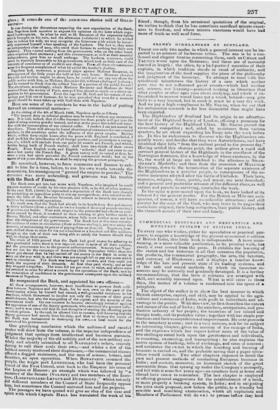SKENE'S HIGHLANDERS OF SCOTLAND.
THERE are only two modes in which a general interest can be im- parted to an account of barbarous tribes. The one is by a con- densed and elegant treatise concerning them, such as CESAR and TACITUS wrote upon the Germans; and these are of necessity limited in length : the other, by a half-poetical narrative of their exploits, in which tradition stands in stead of authority, and the imagination of the bard supplies the place of the philosophy and judgment of the historian. To attempt to treat a ith dis- quisitioual minuteness the history of a race which 'neither gave rise to nor influenced great events—which had neither art, science, nor learning—produeed nothing in literature that other peoples or after ages care about studying, and w Inch it ex- tinguished to-morrow would leave not a wreck behind—niajs give birth to a very learned, but in sooth it must be a very dry work. And we pay a high compliment to Mr. SKENE, when we say that his antiquarian research is far less distasteful than might have been expected. The Highlanders of Scotland had its origin in an advertise- ment of the Highland Society of London, offering a premium for the best history of the Highland Clans. Mr. SKENE proved the successful competitor ; and, aided by assistance from various quarters, he set about expanding his Essay into the work before us. In this he endeavours to discover who the Highlanders ori- ginally were; and decides that they were Autochtliones, and have inhabited their hills " from the earliest period to the present day." Having settled this obscure point, the author gives a rapid and succinct general history of the Highlands to the overthrow of the Norwegian dominion. (for a knowledge of whose existence, by the by, the world at large are indebted to the allusions in SHAK- SPEARE'S Macbeth); and then from the accession of Maseosx KENMORE, down to the termination of the separate existence of the Highlanders as a peculiar people, in consequence of the co- ercive measures adoptcd after the battle of Culluden. Their laws, manners, religion, dress, poetry, and music, are next described; and a general and paiticular account of the different clans, us well extinct and pseudo as surviving, concludes the work.
In the opini n pronounced upon the book, we have looked at its interest for the general reader. For the British or Mile-jams anti- quarian, of course, it will have considerable attraction; and still greater fur thee sous of the Gael, alio may trace in its pages their earth-born origival, their long antiquities, their public history, and the clannish annals of their race and family.


























 Previous page
Previous page